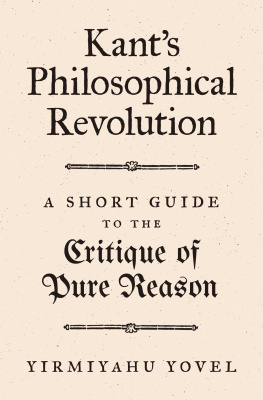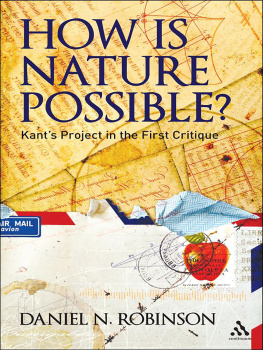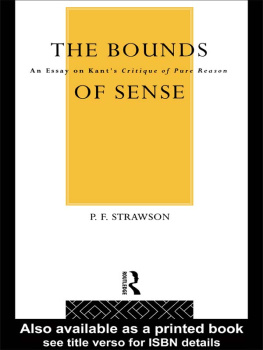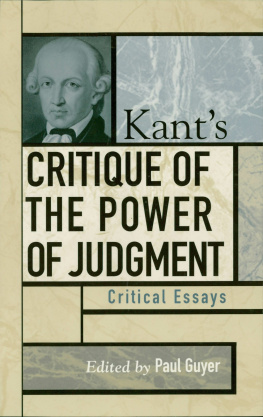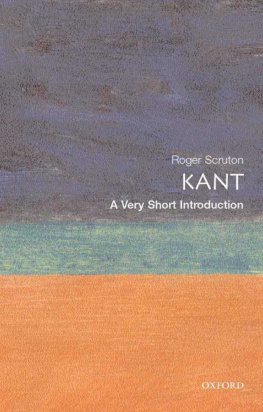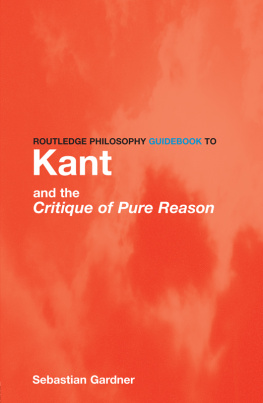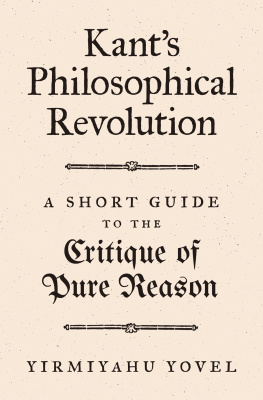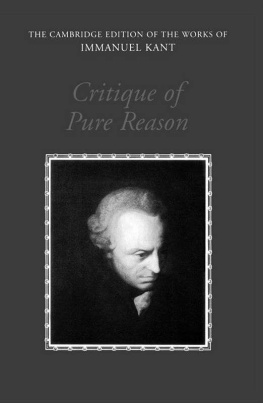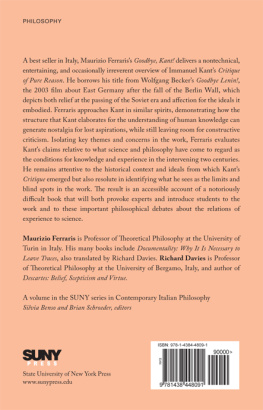Yovel - Kants philosophical revolution: a short guide to the Critique of pure reason
Here you can read online Yovel - Kants philosophical revolution: a short guide to the Critique of pure reason full text of the book (entire story) in english for free. Download pdf and epub, get meaning, cover and reviews about this ebook. City: Princeton, year: 2018, publisher: Princeton University Press, genre: Religion. Description of the work, (preface) as well as reviews are available. Best literature library LitArk.com created for fans of good reading and offers a wide selection of genres:
Romance novel
Science fiction
Adventure
Detective
Science
History
Home and family
Prose
Art
Politics
Computer
Non-fiction
Religion
Business
Children
Humor
Choose a favorite category and find really read worthwhile books. Enjoy immersion in the world of imagination, feel the emotions of the characters or learn something new for yourself, make an fascinating discovery.
Kants philosophical revolution: a short guide to the Critique of pure reason: summary, description and annotation
We offer to read an annotation, description, summary or preface (depends on what the author of the book "Kants philosophical revolution: a short guide to the Critique of pure reason" wrote himself). If you haven't found the necessary information about the book — write in the comments, we will try to find it.
Yovel: author's other books
Who wrote Kants philosophical revolution: a short guide to the Critique of pure reason? Find out the surname, the name of the author of the book and a list of all author's works by series.
Kants philosophical revolution: a short guide to the Critique of pure reason — read online for free the complete book (whole text) full work
Below is the text of the book, divided by pages. System saving the place of the last page read, allows you to conveniently read the book "Kants philosophical revolution: a short guide to the Critique of pure reason" online for free, without having to search again every time where you left off. Put a bookmark, and you can go to the page where you finished reading at any time.
Font size:
Interval:
Bookmark:

KANT S PHILOSOPHICAL REVOLUTION
Kants Philosophical
Revolution
A SHORT GUIDE TO THE
CRITIQUE OF PURE REASON

Yirmiyahu Yovel
PRINCETON UNIVERSITY PRESS
PRINCETON & OXFORD
Copyright 2018 by Yirmiyahu Yovel
Requests for permission to reproduce material from this work
should be sent to Permissions, Princeton University Press
Published by Princeton University Press,
41 William Street, Princeton, New Jersey 08540
In the United Kingdom: Princeton University Press,
6 Oxford Street, Woodstock, Oxfordshire OX20 1TR
press.princeton.edu
Jacket art: Ornaments from the title page of the original 1781 edition
of the Critik der reinen Vernunft by Immanuel Kant
All Rights Reserved
ISBN 978-0-691-18052-6
Library of Congress Control Number: 2017962524
British Library Cataloging-in-Publication Data is available
This book has been composed in Miller
Printed on acid-free paper.
Printed in the United States of America
10 9 8 7 6 5 4 3 2 1
CONTENTS
PREFACE
PERHAPS THE MOST influential book of philosophical modernity, Kants Critique of Pure Reason, is also one of the hardest to read. Both in substance and in style it often makes the reader wonder where the argument goes, or how to understand a difficult idea or tortuous sentence. Not only was Kant a philosophical revolutionary, he also had to invent the language by which to express his innovative ideas; and in both ways he had to act as pathbreaker. (He was also writing fast, as if to beat a deadline.) No wonder the Critique was misunderstood from the start (which made Kant revise it in the second edition) and has been the object of diverging interpretations.
This short book is intended to help readers find their way through the web of Kants classic. It is intended not as a defense, or evaluation, but as a descriptive explication. Leaving many secondary matters on the sidelines, I distilled the major issues and arguments and present them in the order in which they arise in the book. The result is an interpretation carried out by a systematic exposition.
The text is based on the introduction to my Hebrew translation of the Critique of Pure Reason, published with notes a few years ago in Tel-Aviv. This was a massive undertaking that, as often happens, claimed my time and dedicated energy far more than had been anticipated at the outset. Even the projects happy conclusion did not allow me the luxury of rest. Colleagues and students urged me to translate the text of the introduction into English as a stand-alone book, a systematic guide that provides both an overview of the whole Critique in context (as Kant insisted it should be treated) and an elucidation of the train of ideas and arguments through which Kants philosophical revolution is carried out.
This work would never have taken off, let alone be concluded, without the determined and loving support of my wife, the writer Shoshana Yovel, who is my first reader and critic. I am also indebted to the many who encouraged me along the way with a cheerful reaction or wise comment, and created a mood of expectation that helped me persist. Most valuable was the input of talented and curious students of several generations who took part in my Kant seminars in Jerusalem and New York. Among my former assistants I thank in particular Pini Ifergan, Dror Yinon, Tal Kohavi, Gal Katz, and Ohad Reis.
Institutionally, I thank the Hebrew University of Jerusalem, my first academic home, and the New School for Social Research, New York, my second academic home, for providing a suitable environment for intellectual work. My friend Martin Gross of Livingston, New Jersey, was a frequent visitor in my seminars at the New School. A philosopher and businessman, Marty demonstrated a keen interest in my Kant project and provided a research grant to facilitate its progress. Thanks are also due to the German-Israeli Research Foundation (GIF) for financial and administrative support. And, as in most of my former books, Eva Shorr, Associate Editor of the Jerusalem Philosophical Quarterly IYYUN, was always available for intelligent consultation.
PART ONE
Preliminary Observations:
Rethinking the Object
KANT MAINTAINS THAT every human advancement, especially in the sciences, originates in a revolution in the mode of thinking, which elevates a certain domain of knowledge to the level of an apodictic science. In the past, this had taken place in mathematics and physics, and now, after many centuries of groping in the dark, the conditions are ripe for a revolution that would signal the royal road also for philosophy.
The core of the philosophical revolution lies in a completely new understanding of the concept of object, or objective being, and its relation to human knowledge. Kant compares the required reversal to the one Copernicus performed in astronomy. Until Copernicus, the earth was seen as fixed in the center and the sun as revolving around it. Copernicus made us see that, on the contrary, the sun stands in the center while the earth revolves around it. Similarly, philosophers since ancient times believed that human knowledge revolves around the object, that is, must fit the structure and features of an object that stands in itself independently from the outset, and does not depend on the process of knowledge. The Kantian revolution abolishes the objects metaphysical independence and makes it dependent on the structure of human knowledge. The structure of the objectmeaning the empirical object, the only one we knowis derived a priori (free of sense-experience) from the human understanding (intellect) that connects a multitude of sensible items into a unity; and the modes of this unification are drawn from the primordial unity of the I think. Kants bold idea thus says that the understanding, in knowing the world, does not copy the basic patterns of its knowledge from the world, but rather dictates these patterns to the world. Doing so is a condition for the very existence of an empirical world ruled by necessary laws (which alone deserves the title objective), and for the existence of real objects and events in it.
This means not that the human understanding creates the world ex nihilo, but that it constitutes a cosmos from chaos. The understanding is a formal, a priori structure that cannot function without the material we acquire from the senses by being passively exposed to them. The senses supply the understanding with a crude element that is not yet a real object but only the material for it; and the understanding, a spontaneous factor, must order and shape this material according to its (the understandings) own a priori modes of operation.
This implies that objectivity is a status that is constituted rather than immediately given or passively encountered. When the understanding applies its a priori patterns, called categories, to the sensible material, it creates an objective synthesis between them. It is this objective synthesis that constitutes the empirical entities and states of affairs that deserve being called real or objective. As such, the concepts object, objectivity, and empirical reality acquire a radically new philosophical interpretation.
At the background of this doctrine stands the recognition that all the contents of our thinking and perception are mental images (called ideas by Descartes and Hume, and representations [Vorstellungen] by Kant) and never things beyond the mind. Humans have no way of leaping outside the sphere of the mental and hold on to something that lies in itself beyond their representations. Therefore, even such features as permanence and substantiality, and the rest of the necessary relations that build up an objective state of affairs, must be drawn
Next pageFont size:
Interval:
Bookmark:
Similar books «Kants philosophical revolution: a short guide to the Critique of pure reason»
Look at similar books to Kants philosophical revolution: a short guide to the Critique of pure reason. We have selected literature similar in name and meaning in the hope of providing readers with more options to find new, interesting, not yet read works.
Discussion, reviews of the book Kants philosophical revolution: a short guide to the Critique of pure reason and just readers' own opinions. Leave your comments, write what you think about the work, its meaning or the main characters. Specify what exactly you liked and what you didn't like, and why you think so.

